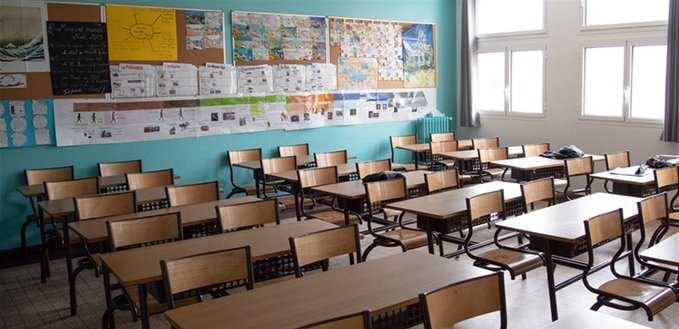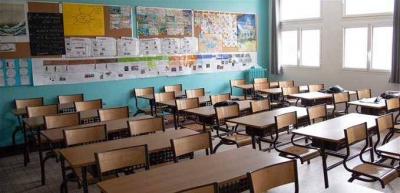The Acting General Director of Education and Head of Private Education, Imad Ashqar, admitted the Ministry of Education's inability to hold schools accountable for "dollarizing" their fees. In an interview with "Al-Akhbar," he refrained from considering the paralysis of educational arbitration councils as intentional. He threatened to stop the signatures of private school directors who forged student grades that were meant to be added to the total score for the Brevet certificate but were canceled due to the forgery.
He also committed to working on closing schools that operate like businesses. He noted that considering the official examinations as an achievement is surprising, given many questions arose after the results were published, casting doubt on the validity of the perfect scores and the number of different evaluations comparing students' performances in their respective schools and secondary institutions.
When asked for his interpretation of the results, he stated that if we compare the results of the last official Brevet examinations in 2018 to those of this year, we find that the overall pass rate decreased from 81% to 79%, despite reductions in the curriculum and the number of subjects. This drop is, of course, related to the exceptional circumstances and two years of closures due to COVID-19. While the examinations are an achievement in terms of securing their financial resources and providing monitoring and grading incentives for teachers, holding the Brevet exams again after being suspended for two years is, for him, a positive step, especially in the eyes of the international community and donor countries.
On the subject of the discrepancies between official and school evaluations, he remarked that it's not new nor a standard measure applicable to the 61,000 students who took the exams. There were attempts at cheating that were detected, and others that went unnoticed. Some students did not study throughout the academic year because they did not believe the exams would take place; once they realized it was indeed a reality, they joined tutoring centers in the last two months.
Regarding the ongoing insistence on adding students' school averages as a subject to the total score for the Brevet certificate, despite warnings about potential manipulation, he clarified that they did not wait for the schools to "manipulate" the situation, as the decree left the Education Minister the authority to suspend the matter related to school grades. This occurred when they discovered through an electronic program that success rates would not be logical, enabling some students to pass at the expense of others.
Additionally, Ashqar expressed his intent to implement strict measures against private school owners who sent him inflated average grades for their students, indicating that he wanted to know the identity of students receiving such high marks, promising appropriate recognition for the directors of those schools while starting with halting their signatures and rejecting their lists. He emphasized that in the private education sector, he would enforce the law through warnings and reprimands.
Discussing the impact of dollarization of fees in most schools, he mentioned that he had warned both the former Minister of Education Tarik Majzoub and the current Minister Abbas Halbi that dollarization would explode in everyone's faces as no one works for free, citing essential expenses that schools must cover. Almost no private school has refrained from dollarization, which inflated fees in Lebanese pounds simultaneously.
The core issue lies in the law regulating school budgets and the definition of school fees under Law No. 515, which was valid when it was issued in 1996 but is no longer applicable and requires a complete reevaluation. Last year, they referred 73 schools from all regions to the courts without any rulings due to the paralysis of 7 arbitration councils.
When questioned about the absence of educational arbitration councils despite more than 15 years in the Private Education Authority, he stated the issue is political. He expressed skepticism about the interests of private school owners regarding the establishment of arbitration councils and suggested that the continuous postponement of related decrees submitted to the Cabinet since 2016 contributes to the ongoing issue.
He affirmed that the ceiling of the Private Education Authority's work is tied to Article 13 of Law No. 515, which allows for hiring accountants to audit school budgets. Previously, they engaged an accounting firm to review 100 budgets based on complaints from parents’ committees. They found 73 schools in violation of the law and referred them to arbitration councils across the provinces, with 32 schools before the only active arbitration council in Mount Lebanon, which has not yet ruled on any cases.
Ashqar vowed to forward cases of all schools that submitted budgets for the 2021-2022 academic year because all offers were illegal. He acknowledged that there is no prospect for accountability while schools continue to impose hardships on families.
He addressed the financial support for teachers in the private sector, stating that there are approximately 25% of teachers who have left the sector, a figure that also applies to public education. He highlighted the issue of phantom students where the number of teachers exceeds that of students, questioning why such schools have not been closed down yet and critiquing the issuance of exceptional approvals to some while denying them to others.
He distanced himself from any accusations that linked him to these matters, asserting that he does not have the authority to grant exceptional approvals for schools to operate without licenses and has called for the closure of unlicensed schools.
He stressed that the public education sector is experiencing unprecedented decline, particularly with its receipt of tens of thousands of students from private education. He predicted a significant influx of students from private education to public schooling, mainly as the middle-class cannot afford private school fees, warning of an impending class-based education system.
Finally, he acknowledged the significant requests for unpaid leave among teachers, addressing concerns about the educational integrity of the sector and expressing a commitment to continue working on preserving education standards amidst challenging circumstances.




